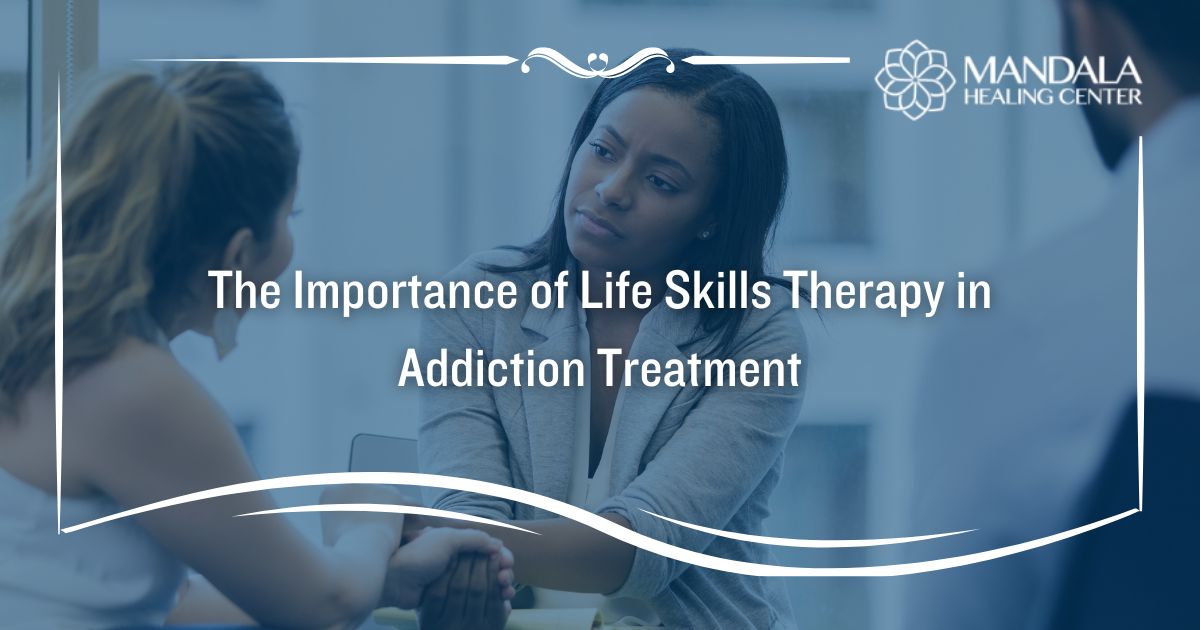Addiction is a complicated condition requiring a comprehensive approach to treatment for lasting recovery. Life skills therapy is among the different therapeutic interventions that can be part of a treatment program. In life skills therapy, the approach goes beyond addressing the immediate effects of addiction. It helps equip you with the skills to effectively and sustainably navigate your daily life.
Life skills therapy can help empower you to regain control over your life, which is often deeply affected by active addiction.
The Effects of Addiction on Your Daily Life and Functioning
A big part of understanding the importance of life skills therapy in addiction treatment stems from seeing how substance abuse disrupts your daily functioning.
Addiction can take a major toll on your mental and emotional health but also severely damage your relationships and social life, your financial stability, and your professional or academic life. Activities while you’re under the influence or to obtain substances can cause legal problems.
Your daily life, when you struggle with addiction, can be chaotic and feel unmanageable. Basic activities like managing your time, maintaining your hygiene and keeping up with home and work responsibilities become overwhelming. Because of the compulsive nature of addiction, getting and using the substance becomes your main focus, to the detriment of the other parts of your life.
Addiction undermines your ability to control your actions and make independent decisions. You may feel powerless because you can’t stop using drugs or alcohol even though you’re aware of the negative consequences. The loss of control you feel can erode your belief in your ability to affect change. This all leads to a cycle of helplessness and dependency.
The far-reaching effects of addiction on every part of your life can highlight the need for comprehensive treatment approaches.
What is Life Skills Therapy in Addiction Treatment?
Life skill training or therapy can be a critical part of addiction treatment focused on equipping you with practical abilities and strategies to navigate your everyday life. Life skills training can give you the skills you need to manage your responsibilities personally, professionally and socially, which are often impaired or neglected because of substance abuse.
When you work on these skills, you can live independently, maintain sobriety, and improve your quality of life.
Specific benefits of life skills therapy in addiction treatment include:
- Independence and self-sufficiency: Addiction can take away your ability to manage your daily responsibilities, but life skills therapy serves as a tool to help you restore these abilities, reduce your reliance on others and promote independence.
- Relapse prevention: Through teaching practical coping strategies and problem-solving skills, life skills therapy can help you handle stress and avoid situations that could trigger a relapse.
- Better quality of life: Effectively managing your responsibilities improves your quality of life, which helps you sustain long-term recovery.
- Confidence and self-efficacy: Mastering new skills and managing life’s challenges can boost your confidence and self-efficacy, both of which are important for sobriety.
While everyone’s treatment plan can be unique, life skills therapy includes a range of capabilities.
What’s Included in Life Skills Therapy?
Some of the things that might be part of life skills therapy include:
- Time management: You can learn to set realistic, achievable goals, prioritize tasks, and create and adhere to schedules on a daily and weekly basis.
- Financial management: You can learn budgeting, financial planning, and employment skills, such as writing your resume and interview preparation.
- Interpersonal skills: These can include verbal and nonverbal communication, strategies to resolve conflicts constructively, and building supportive, positive relationships.
- Stress management: A big part of addiction treatment is the introduction of healthy ways of dealing with stress. You can learn techniques like deep breathing, mindfulness, and meditation, which are beneficial and healthy ways to manage stress.
- Problem-solving: Critical thinking, decision-making and using available resources can all be part of building problem-solving skills.
- Health and wellness: During life skills therapy in addiction treatment, you may learn about the value of nutrition, exercise and getting regular medical care.
How Life Skills Therapy Is Integrated into Addiction Treatment
There are various ways life skills therapy can be integrated into addiction treatment programs. Examples include:
- Individual therapy involves working one-on-one with a therapist to address specific deficits in life skills and develop personalized strategies for improvement.
- Group therapy sessions allow you to practice skills and share experiences while learning from others in a supportive, safe environment.
- Workshops and classes focusing on specific budgeting or stress management skills can be integrated into addiction treatment.
- There may be opportunities to apply learned skills in real-life settings.
- Aftercare planning and programs often continue to support skill-building activities.
Find Help Today
A vital component in addiction treatment, life skills therapy addresses those practical aspects of your daily life that are disrupted by substance abuse. Through teaching essential skills, you’re more empowered to live a fulfilling, independent life. The integration of life skills therapy into addiction treatment enhances the effectiveness of your recovery and improves the likelihood you’ll maintain long-term sobriety.
Life skills training and therapy are part of a holistic approach to treating addiction, considering your needs as a whole person. They often complement therapy interventions like cognitive-behavioral therapies and 12-step programs, providing practical tools for everyday life.
Effective life skills training is tailored to meet your unique needs as an individual. It usually starts with personalized assessments to identify the areas where you need support and ensure the training is relevant and impactful.
Finally, life skills training helps promote community and social reintegration so you can rebuild social networks, find employment and become part of society again.












